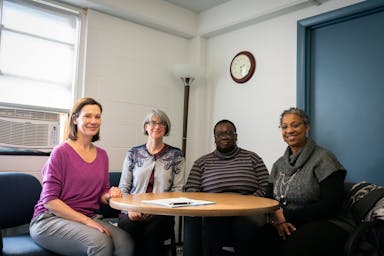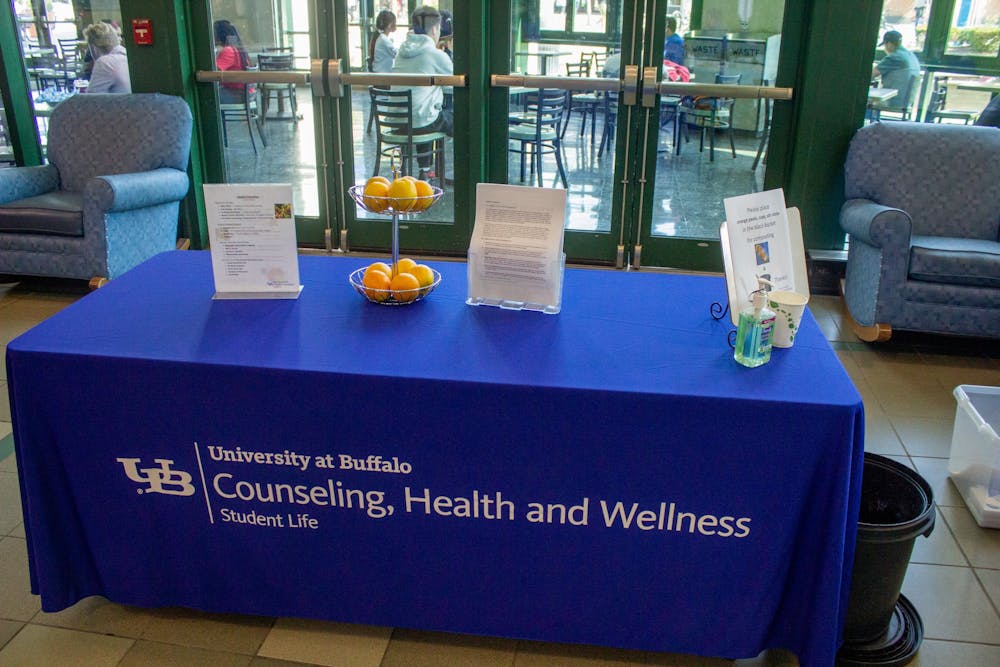Jen Jonas* needed help.
It was the spring of 2020, and her school and life balance was becoming less of a balancing act and more of a pick-up-the-pieces-where-they-fall kind of ordeal.
In an attempt to sort through her mental woes, Jonas went to UB Counseling Services in February 2020 — mere weeks before campus shut down due to COVID-19.
Jonas, who was granted anonymity due to the sensitivity of this topic, completed a same-day needs assessment appointment, the first step toward meeting with a counselor. But then, before she could be paired with a professional staff member, UB Counseling referred Jonas to outside providers, citing a 10 individual appointment limit per academic year and scheduling issues.
Jonas says she felt Counseling Services dismissed her situation as “not being serious,” despite the very severe health impacts she says she was feeling. And she says using an outside provider wasn’t an option for her, because of the associated costs. By comparison, UB’s Counseling Services are free.
“This didn’t really help me at all because my family situation made it so that I wasn’t able to use my health insurance, which is why I went to the UB [Counseling] Services in the first place,” Jonas said. “They told me there was only a limited number of sessions available to a student each year and appointment times also varied, so it felt worthless to put my time into something that wouldn’t help me.”
Jonas isn’t the only student who lacks faith in UB Counseling Services to provide adequate support for a large, increasingly anxious student population. Many students have taken to social media to express their displeasure with UB Counseling Services, dating back years. These students say they are concerned about the 10-appointment limit and scheduling difficulties. They caution UB could face a mental health crisis if it doesn’t invest more money into its counseling department.
Lauren Smith* went to Counseling Services in 2017 as a freshman and felt like her issues weren’t taken seriously enough.
“I went because I was having panic attacks and was depressed,” Smith said. “I went for the consultation and they told me they wouldn’t be able to see me for over a month, possibly two. It was a horrible experience. I wish UB could have helped me because I really did need it.”
While many of the students The Spectrum spoke to complained that their problems were not addressed adequately, even those that did find counseling helpful expressed frustration by the 10-appointment limit.
These students say Counseling Services isn’t well-equipped to deal with students’ long-term mental health problems.
Monique N., a junior, has been attending counseling appointments throughout her time at UB. She says she only recently found out she is approaching the 10-appointment limit.
“I just found out that you only get 10 appointments from August to August, so that sucks… it’s the part that sucks the most,” she said.
Sharon Mitchell, senior director of Student Wellness and director of Counseling Services, says that UB provides more services than other similarly-sized schools.
Mitchell says her department offers short-term therapy because UB has more than 30,000 students, which makes seeing all its students unfeasible if there aren’t defined limits. She also notes that all health services have a scope of service which clearly delineates what they do and don’t do. UB Counseling Services’ scope is short-term individual therapy and unlimited weekly group therapy.
“There is a pretty high demand for services,” Mitchell said. “We have to make sure that we are able to provide some equity in treatment. People who are pretty savvy about mental health services will access them early and stay long term, which makes it harder for those who have issues in late October to then get in for services. We want to serve as many students as possible as long as we are being ethical.”
Mitchell also emphasized the work of UB Health Promotion, which hosts classes in yoga, meditation and healthy eating, resources for sexual violence prevention and other activities designed to reduce stress.
But she acknowledges that while these signify a step in the right direction, the university could be doing more to prevent mental health problems from happening in the first place.
“We should really be doing more instead of catching students downstream when they are already in the river and flailing,” Mitchell said. “We want to not have them in the river at all or at least teach them to swim.”
UB Counseling Services saw 2,165 students during the 2019-20 academic year, making it the least busy year since 2016-17, according to documents obtained by The Spectrum. On Feb. 1, Mitchell hired a new staff member, bringing the total number of counselors to 22.
The department, which services nearly 30,000 students, received roughly $3.57 million in student fees in the 2019-20 academic year. By contrast, UB Athletics received $9.3 million in student fees in that same period.
Mitchell declined to comment on whether she believed comparative underfunding of Counseling Services is an issue. She noted that Counseling Services added four new counselors since she started working there 18 years ago.

College counseling centers across the country have reported an increase in demand for mental health services, dating back years. A 2019 study from the Association for University and College Counseling Center Directors found that 90% of counseling centers saw an increase in students seeking services from the year before.
Researchers from Texas A&M University and Houston Methodist Hospital found in September that 71% of college students have reported increased stress and anxiety levels due to COVID-19. Students’ mental health is already frail; the pandemic has only made things worse.
Nini Pandit, a freshman architecture major, says that although she benefits from counseling, she still has her concerns. Before her first appointment, she was repeatedly told that counseling isn’t therapy and that there is a 10-appointment limit. She was told she could be referred to an outside provider if she needed more appointments.
But during a referred evaluation from a nurse practitioner for counseling, Pandit noticed something was off.
“The miscommunication between the two offices [Counseling Services and Health Services] is quite something,” Pandit said. “The practitioners treat the counselors as therapists. If they decided to put you on medication and you consent, you will still have to see the counselor on campus. I personally thought this was unfair considering you get 10 very spaced out sessions in a year which is at least two semesters, or 30 weeks.”
Mitchell says Counseling Services has psychiatric nurse practitioners who assess the need for and prescribe psychiatric medications to students.
Mitchell says she is frustrated that some students are unhappy with Counseling Services. She says she hopes fewer students will need to use these services and that students will learn skills that will enable them to live emotionally fruitful lives.
“There is this cultural thing. ...I also feel like normal emotional distress is being pathologized so when people are upset or when people are struggling, rather than viewing it as a normal given whatever is going on in their lives, it is deemed as a mental health problem,” Mitchell said. “It might not be a mental health [problem] but a life problem. It might be about how to manage the problems life throws at them.”
Mitchell says that Counseling Services’ old model, which entailed students calling ahead to schedule appointments, worked to connect students with counseling, no matter the scope of the problem. She says Counseling Services’ new model, adopted in fall 2019, seeks to figure out the best individualized help for students, rather than assuming everyone who is in emotional distress needs therapy.
Mitchell’s approach may be supported clinically, but many students still have reservations about the lack of counseling options.
Reddit, which has become a popular place for students to vent about negative counseling experiences, is filled with comments like, “UB has mental health services for the sake of having it” and “UB’s mental health services aren’t top of the line by any standard: it takes ages to see someone.”
More concerningly, the aggregator has a plethora of posts documenting the emotional toll students face during the semester. The spring has been an especially rough semester for students, as hundreds have taken to Reddit, Instagram, Change.org, this publication and other platforms to express their frustrations with the breakless semester.
But Mitchell believes social media doesn’t show the full picture, and that in fact, students actually usually express satisfaction when asked about Counseling Services.
“We give students satisfaction surveys that are anonymous throughout the year, and generally students say they are satisfied with services,” Mitchell said. “I think on social media sometimes people who are dissatisfied are the ones that go on to social media more than those who are satisfied.”
UBCS’ 2020-21 Client Satisfaction Survey, which polled 197 students — 78.7% of whom attended at least two counseling sessions — found that students were generally satisfied with their counseling experience. Students agreed that their counselors were compassionate and respectful and sensitive to their identities.
But the survey only included 42 students who attended only a needs-based assessment or a single session.
The new model has decreased the time it takes to secure an initial appointment and has nearly eliminated the number of appointment no-shows, but students say that isn’t enough.
“It doesn’t make sense to me that [UB would] have these services, but they don’t really do anything beneficial for the students,” Jonas said. “The understanding I left the meeting with was that the Counseling Services were for people in crisis. UB really needs to invest in helping the mental health of their students in a way that goes beyond bringing therapy dogs to the library.”
The features desk can be reached at features@ubspectrum.com

Julie Frey is a senior news/features editor at The Spectrum. She is a political science and environmental studies double major. She enjoys theorizing about Taylor Swift, the color yellow and reading books that make her cry. She can be found on Twitter @juliannefrey.





